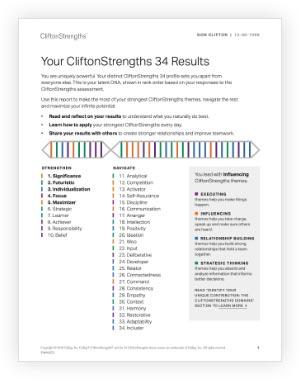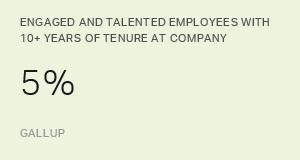Story Highlights
- Brace for (more) job displacement and skill shortages
- Hiring and firing based on skills is not a sustainable strategy
- Focusing on talents and strengths provides direction and stability
The World Economic Forum (WEF) estimates that artificial intelligence will displace 75 million jobs across the globe by 2022 and that the pace will only continue to increase. A PwC report predicts that 38% of jobs in the U.S. -- as well as 30% in the U.K., 35% in Germany and 21% in Japan -- could be gone by 2030.
Does this mean organizations will just require fewer people in the future? Many current predictions say no. The WEF estimates that automation will actually create 58 million more jobs than it replaces by 2022. McKinsey calculates that rising incomes could create 250 million additional jobs by 2030.
While many jobs will become obsolete -- either because the job can be fully automated or because a few people with the right tools can do the work of hundreds -- new jobs will be conceived to fulfill new customer needs, leverage new technologies and execute new business strategies.
However, pink-slipping employees whose jobs were automated and recruiting new people with a more high-tech skill set may be a losing strategy.
Given that the hurried pace of technological advancements means that the half-life of knowledge, skills and qualifications is constantly becoming shorter and shorter, a "lay off old and hire new" strategy produces an ever-accelerating cycle of recruiting and firing -- which is expensive, builds inefficiencies into the system and drains organizational knowledge.
It also depletes organizational talent, which is any company's most valuable resource. A chronic labor shortage from layoffs puts a business behind its competition. It also weakens its position in the labor market, given the toll that mass firings have on an employer's brand.
Not all companies are investing in reskilling. Some have tried and found it difficult to do well. But for those that are committed to doing it, a better strategy is to assess the talent on hand, evaluate current and future business needs, find matches between the two, and then -- and only then -- train for skills.
But before any of that can be done, leaders need to know the practical difference between talent and skills. That understanding can have a major impact on profitability and the capacity to compete in an evolving business environment.
Your results depend on your talent -- and your talent is scrolling through company reviews.
The essential, unchangeable difference between talent and skills is that skills are learnable and talent is innate. While certain skills (e.g., bookkeeping) may no longer be necessary when AI duplicates human skills, the accountant's talent for taking responsibility, her eye for detail and her ability to put data in context are critical to business outcomes in every organization, today and tomorrow.
And they're not specific to accounting. Those valuable talents can be applied in new roles -- and Gallup's extensive studies of talent's impact on performance show that well-deployed talent clearly drives performance and business outcomes.
One financial institution, for example, achieved 43% higher year-over-year revenue growth in branches staffed by managers selected for talent compared with branches run by less talented managers. At a leading medical technology company, high-talent sales representatives produced over one-third more sales growth than their typical peers. Overall, organizations that use talent assessments as part of their selection process have been found to achieve significantly higher productivity (10%), sales (20%) and profitability (30%), as well as lower turnover (10%).
So when that accountant and many others lose their jobs to a bot and the company decides to lay them off, the company loses their unteachable talents -- and the opportunity to apply those talents to newly created jobs.
Meanwhile, the labor market is busily learning about her experience on sites like Glassdoor and Indeed. When her organization posts ads for new positions, top talent is aware that the company fires people who could have been reskilled or repositioned. Those potential recruits may well wonder why they should buy into that company's vision and promises, go above and beyond for it, when the organization shows little allegiance to its people.
Top talent looks for employers that help people build their careers -- 59% of millennials say opportunities to learn and grow are extremely important to them when applying for a job. Most workers, especially young people, know their skills will become outdated and expect reskilling during their careers. They won't want to join an organization with such a shallow commitment to development. A company that proves it values talent, on the other hand, proves its viability as an employer. And that commitment is a double-edged advantage: Respect for talent can also be used as a mechanism to encourage workers to reskill for jobs they've never heard of.
Set up reskilling initiatives.
Adults draw much of their professional confidence from career qualifications and past successes. Workers invest significant psychological meaning in their credentials and experience. And they aren't certain which skills they'll need in the future -- no one is -- which makes today's reskilling programs a dubious proposition to some.
Like the horse carriage manufacturers who figured the whole "automotive" thing would just blow over, they don't want to admit that their credentials have little currency anymore. They don't want to invest in skills they aren't sure they'll need. They don't want to start all over. That's human nature, but it dooms corporate reskilling initiatives and forces companies to hire from outside.
The reality is that very few jobs are secure anymore. Technology is automating even highly skilled white-collar jobs -- such as law -- as well as blue-collar and lower-skill jobs. We're all horse carriage manufacturers to some extent. But we all have valuable talents that can be put to use in new paradigms ... if we know how.
Strengths-based organizations help employees identify and leverage their talents and assure workers that they have far more to offer than their hard-won but outdated qualifications. That improves their performance, of course, but it also creates the emotional security that workers need to tackle learning completely new skills. Moreover, strengths-based companies have a methodology to match talents to reskilling programs based on forecasted job needs. This increases their capacity to staff internally and eases the frantic search for new talent to fill critical positions.
The current state of organizational learning and development indicates that companies need this approach sooner rather than later. Although Amazon, for example, recently announced a $700 million reskilling program, and although most CEOs are worried about talent gaps in their companies, effective learning and development initiatives are scarce. Only 32% of employees worldwide currently work in an environment that fosters their development, and only 22% strongly agree that they are developing and expanding their knowledge and skills every day, according to the Gallup World Poll.
This is not an employee value proposition that can endure much longer. The future is here now. Jobs need filling now. That means people need reskilling now. Companies can grease the revolving employee door and accept a future of chronic skills shortages and incessant recruiting, or they can delve into strengths science and become their own best source of talent.
But they do have to make a choice and make it soon. The market is not patient -- and neither is talent.
Keep your stars by putting performance development at the heart of your culture:
- Discover how strengths-based development drives performance and how you can make CliftonStrengths an essential part of your culture.
- Learn how to place talent at the core of your human capital strategy by enrolling managers in our Employing Top Talent course.
- Download Gallup's perspective paper Building a Culture That Drives Performance.
- Learn how CliftonStrengths solutions for managers can help you maximize your team's potential.





